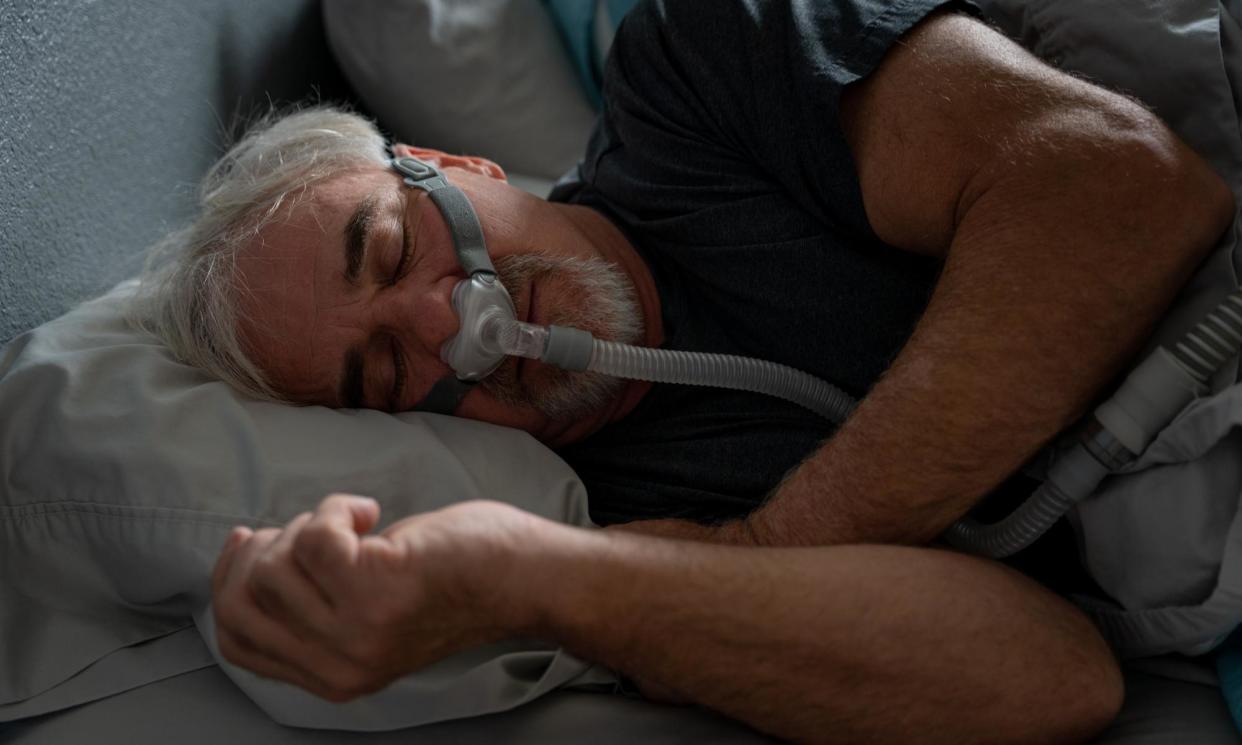Weight loss drug could ease sleep apnoea in people with obesity, study says

A drug used for type 2 diabetes and weight loss could reduce the severity of obstructive sleep apnoea (OSA) in people with obesity, research suggests, raising the possibility of the first pharmaceutical treatment for the condition.
Tirzepatide, which is made by Eli Lilly and Company, together with other medications such as Wegovy from Novo Nordisk, are part of a new wave of medications sometimes referred to as “skinny jabs” because they can result in dramatic weight loss.
Now researchers say tirzepatide could help people with OSA, a disorder whereby breathing stops and starts during sleep as a result of the upper airway narrowing or collapsing.
“It’s estimated that up to 3 million people in the UK may have OSA but have not yet been diagnosed,” said Dr Kunal Gulati, the executive director for diabetes and obesity medical affairs at Lilly Northern Europe.
“Tirzepatide has the potential to be the first pharmaceutical treatment for OSA, which could address the unmet need for people living with this condition.”
OSA can result in disrupted sleep, excessive daytime sleepiness, an increased risk of serious heart problems and stroke, and cause relationship difficulties.
Many people who live with OSA rely on a device called a Cpap (continuous positive airway pressure) machine, which – as the NHS notes – pumps air into a mask worn over the mouth or nose during sleep.
Related: Diabetes drug leads to notable weight loss in people with obesity – study
Writing in the New England Journal of Medicine, an international team of researchers including scientists at Lilly, report how they conducted two phase three randomised control trials in patients with obesity and OSA. According to Lilly, one trial involved 234 patients who were not using a Cpap machine, and the other involved 235 patients who were.
In each trial, patients were split into equal size groups and given an injection containing either tirzepatide or a placebo for 52 weeks.
The team looked at the average number of instances of reduced breathing (hypopneas) and stops in breathing (apneas) in an hour of sleep.
At the start of the first trial, patients experienced 51.5 such events per hour on average. However, those given tirzepatide experienced on average 25.3 fewer such events per hour at 52 weeks, while those given a placebo had an average reduction of 5.3 events per hour. In the second trial, the average reductions in events per hour were 29.3 for tirzepatide and 5.5 for the placebo from a starting figure of 49.5 events per hour on average.
The team say the most common side-effect of tirzepatide was mild to moderate stomach issues.
In both trials, participants given tirzepatide also experienced significant weight loss, had improvements in systolic blood pressure, and reported improved sleep-related outcomes, among other changes.
A spokesperson for Lilly said approximately 70% of people diagnosed with OSA also lived with obesity.
“In addition to reduction in body weight, we believe that reduction in tongue, airway and visceral ectopic fat deposits may have an additional beneficial effect in people living with OSA and obesity,” they said.
In an accompanying editorial, Dr Sanjay Patel of the University of Pittsburgh, said an evaluation of further metrics would be necessary “to fully understand the magnitude of clinical benefit and allow comparisons with existing therapies for obstructive sleep apnoea”.
However Prof Naveed Sattar, an expert in metabolic health at the University of Glasgow, said the results were really exciting and could revolutionise sleep apnoea care in people living with obesity. He also noted weight loss would offer patients many other benefits that treatments such as Cpap did not provide.
“Considerable evidence has pointed to obesity being a strong risk factor for sleep apnoea. To now see substantial improvements in sleep-related patient reported outcomes following large-scale weight loss with an anti-obesity medicine is excellent and will change practice,” Sattar said. “Such evidence further underlines how important tacking obesity is to both treat and prevent multiple chronic conditions that cause considerable suffering for many people in society.”

 Yahoo News
Yahoo News 
